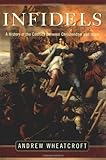Infidels : a history of the conflict between Christendom and Islam / Andrew Wheatcroft. [print]
Material type: TextPublication details: New York : Random House, (c)2004.Edition: first U.S. editionDescription: xxxi, 427 pages : illustrations, maps ; 25 cmContent type:
TextPublication details: New York : Random House, (c)2004.Edition: first U.S. editionDescription: xxxi, 427 pages : illustrations, maps ; 25 cmContent type: - text
- unmediated
- volume
- 9781400062300
- 9781588363909
- BP172
- BP172.W556.I545 2004
- COPYRIGHT NOT covered - Click this link to request copyright permission:
| Item type | Current library | Collection | Call number | Status | Date due | Barcode | |
|---|---|---|---|---|---|---|---|
 Circulating Book (checkout times vary with patron status)
Circulating Book (checkout times vary with patron status)
|
G. Allen Fleece Library CIRCULATING COLLECTION | Non-fiction | BP172.W52 2004 (Browse shelf(Opens below)) | Available | 31923001826987 |
Browsing G. Allen Fleece Library shelves, Shelving location: CIRCULATING COLLECTION, Collection: Non-fiction Close shelf browser (Hides shelf browser)
| No cover image available | No cover image available |

|

|
No cover image available | No cover image available |

|
||
| BP172.W2615 1994 Islam : an introduction for Christians / | BP172.W33 1991 Muslim-Christian encounters : perceptions and misperceptions / | BP172.W38 2005 Understanding Islam and Christianity made easy / | BP172.W52 2004 Infidels : a history of the conflict between Christendom and Islam / | BP172.Z4 1997 Muslims and Christians face to face / | BP172.Z79 Call to prayer / | BP173.J8 H574 2013 A history of Jewish-Muslim relations : from the origins to the present day / |
Originally published: London : Viking, 2003.
Acknowledgments -- Editorial note -- Maps -- Preface -- Chapter 1. "We praise thee, O God" : Lepanto, 1571 -- Chapter 2. First contact -- Chapter 3. Al-Andalus -- Chapter 4. "The jewel of the world" -- Chapter 5. Eternal Spain -- Chapter 6. "Vile weeds" : malas hierbas -- Chapter 7. To the Holy Land -- Chapter 8. Conquest and reconquest -- Chapter 9. Balkan ghosts? -- Chapter 10. Learning to hate -- Chapter 11. "A broad line of blood" -- Chapter 12. "Turban'd and scimitar'd" -- Chapter 13. The black art -- Chapter 14. Maledicta : words of hate -- Chapter 15. The better angels of our nature -- Notes on the text -- Sources and select bibliography -- Index.
Here is the first panoptic history of the long struggle between the Christian West and Islam. In this dazzlingly written, acutely nuanced account, Andrew Wheatcroft tracks a deep fault line of animosity between civilizations. He begins with a stunning account of the Battle of Lepanto in 1571, then turns to the main zones of conflict: Spain, from which the descendants of the Moors were eventually expelled; the Middle East, where Crusaders and Muslims clashed for years; and the Balkans, where distant memories spurred atrocities even into the twentieth century. Throughout, Wheatcroft delves beneath stereotypes, looking incisively at how images, ideas, language, and technology (from the printing press to the Internet), as well as politics, religion, and conquest, have allowed each side to demonize the other, revive old grievances, and fuel across centuries a seemingly unquenchable enmity. Finally, Wheatcroft tells how this fraught history led to our present maelstrom. We cannot, he argues, come to terms with today's perplexing animosities without confronting this dark past.
COPYRIGHT NOT covered - Click this link to request copyright permission:
There are no comments on this title.
